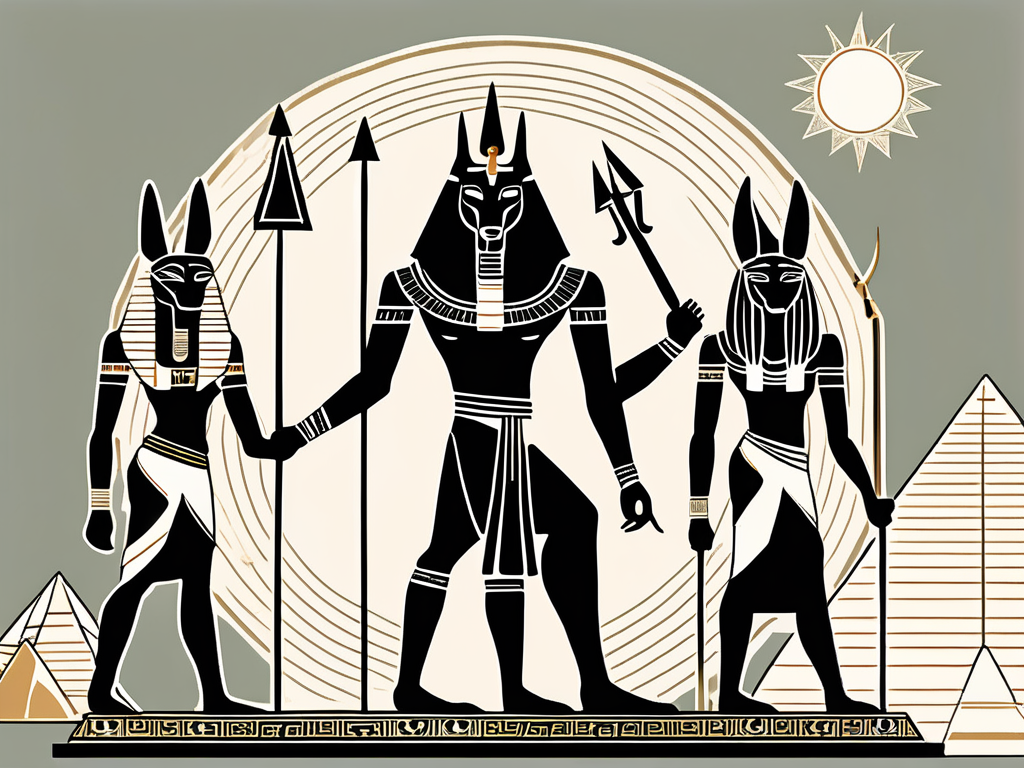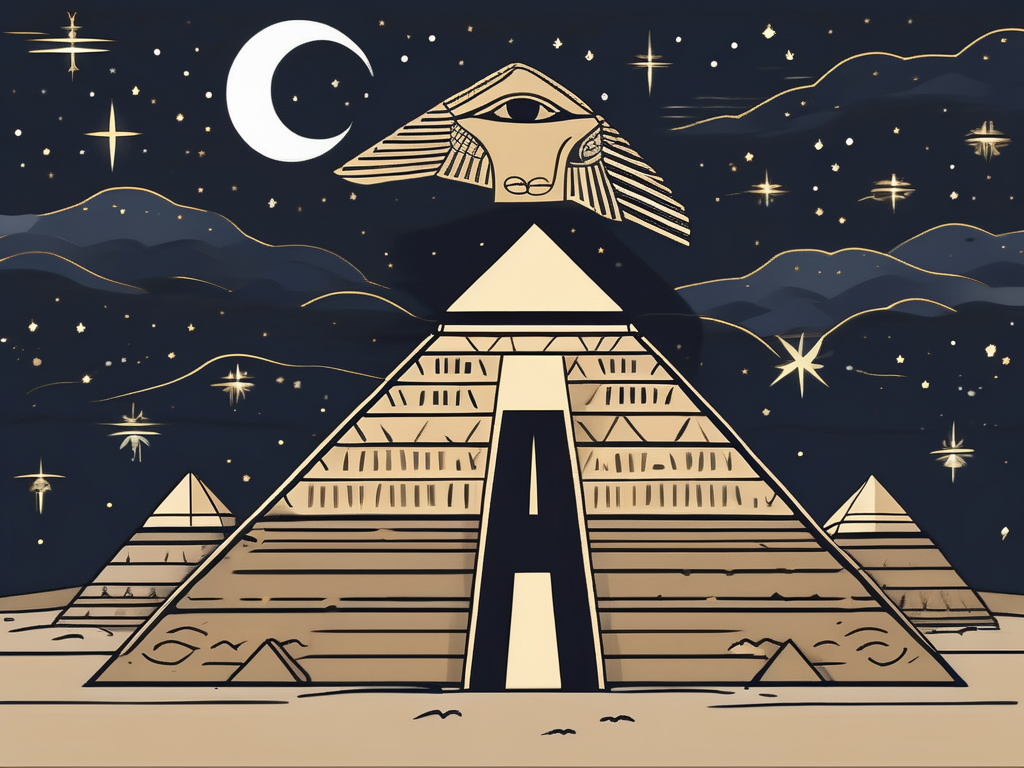Egyptian mythology is a fascinating subject that has captivated people for centuries. The ancient Egyptians believed in a vast pantheon of gods, each with their own unique powers and abilities. In this article, we will delve into the powers and abilities of the Egyptian gods, shedding light on their significance in ancient Egyptian society and their lasting impact on modern culture.
Understanding the Pantheon of Ancient Egypt
Ancient Egypt was a polytheistic society, meaning they worshipped many gods. These gods played a vital role in every aspect of Egyptian life, from religious rituals to daily activities. The belief in these gods provided the ancient Egyptians with a sense of security and reassurance in an otherwise uncertain world.
The gods of ancient Egypt were often depicted as human-animal hybrids, each representing different aspects of life and nature. They possessed extraordinary powers and abilities that were both awe-inspiring and feared.
The Importance of Gods in Ancient Egyptian Society
For the ancient Egyptians, gods were the guardians and protectors of their civilization. They believed that these deities controlled the forces of nature, ensuring the success of crops, fertility, and overall prosperity.
The gods were also closely tied to the pharaoh, who was considered the earthly embodiment of the gods. This divine connection demonstrated the immense power and influence that the gods held over all aspects of Egyptian society.
Ancient Egyptians would often make offerings and perform rituals to appease the gods and seek their favor. These rituals were elaborate and involved intricate ceremonies, prayers, and sacrifices. The people believed that by honoring the gods, they would ensure their own well-being and the prosperity of their communities.
The gods were not only worshipped in temples but also had their own dedicated shrines in homes. These shrines served as a focal point for daily prayers and offerings, allowing individuals to maintain a personal connection with the gods.
The Hierarchical Structure of Egyptian Deities
The gods of ancient Egypt were organized in a hierarchical structure, each with their own specific roles and responsibilities. At the top of the hierarchy stood the creator god, Atum-Ra, who was believed to have brought the world into existence.
Beneath Ra were powerful gods such as Osiris, the god of the afterlife, and Isis, the goddess of magic and healing. These gods held immense power and were revered by the ancient Egyptians.
Osiris, the god of the afterlife, played a crucial role in Egyptian mythology. He was believed to judge the souls of the deceased and determine their fate in the afterlife. The ancient Egyptians held elaborate funeral rituals and ceremonies to ensure the safe passage of the soul into the realm of Osiris.
Isis, the goddess of magic and healing, was highly respected for her ability to perform miracles and bring about healing. She was often invoked by individuals seeking relief from ailments or hoping for a successful outcome in difficult situations.
Further down the hierarchy were lesser-known gods like Sobek, the crocodile god of strength and power, and Hathor, the goddess of love, beauty, and music. Sobek was particularly revered in areas where crocodiles were prevalent, as the ancient Egyptians believed he could protect them from the dangers of the Nile. Hathor, on the other hand, was associated with joy, love, and fertility, and was often depicted as a cow or a woman with cow horns.
Each god and goddess in the Egyptian pantheon had their own unique stories, symbols, and rituals associated with them. These stories were passed down through generations, ensuring the gods’ continued presence and influence in Egyptian society.
The Divine Abilities of Major Egyptian Gods
Among the many gods worshipped in ancient Egypt, some stood out for their extraordinary powers and abilities. These gods were worshipped and feared for their immense control over various phenomena and aspects of life.
The Sun God Ra and His Solar Powers
Ra, also known as Amun-Ra, was the most powerful god in the Egyptian pantheon. He was associated with the sun and was believed to sail across the sky during the day and descend into the underworld at night.
Ra’s solar powers allowed him to provide light and warmth to the world. The ancient Egyptians believed that Ra’s movements across the sky influenced the cycle of day and night and the changing seasons.
They also revered Ra as the creator god, as he was responsible for the creation of all life on earth. Ra’s solar powers were seen as a symbol of life and vitality.
Isis, the Goddess of Magic and Healing
Isis was one of the most revered goddesses in ancient Egypt. She held immense magical powers and was believed to possess the ability to heal the sick and injured.
Isis played a crucial role in the story of Osiris, her husband and brother, who was murdered by their jealous brother Set. Through her magic and perseverance, Isis was able to resurrect Osiris and bring him back to life.
Her healing abilities made her a much-loved goddess among the ancient Egyptians, who sought her assistance in times of illness and suffering.
Anubis, the God of Death and Afterlife
Anubis was often depicted as a jackal-headed god and was responsible for guiding souls to the afterlife. He possessed the ability to judge the hearts of the deceased, determining their fate in the afterlife.
As the god of death, Anubis played a crucial role in the embalming and mummification process. The ancient Egyptians believed that his powers granted them passage into the afterlife and ensured their eternal rest.
Lesser-Known Egyptian Gods and Their Powers
While the major gods of ancient Egypt held immense power and influence, there were also lesser-known gods who possessed their own unique abilities.
Sobek, the Crocodile God of Strength and Power
Sobek, often depicted as a crocodile, was associated with the Nile River and its fertile banks. He was believed to possess immense strength and power, which he used to protect and bless the people of Egypt.
The ancient Egyptians revered Sobek and sought his favor for protection against the dangers of the Nile, such as crocodile attacks and floods.
Hathor, the Goddess of Love, Beauty, and Music
Hathor was a multifaceted goddess associated with love, beauty, and music. She was often depicted as a cow or as a woman with cow horns, symbolizing fertility and abundance.
Ancient Egyptians sought Hathor’s blessings for love, marriage, and fertility. Her musical abilities were believed to bring joy and harmony to the world, soothing the souls of both humans and gods.
The Symbolism and Representation of Godly Powers
The gods of ancient Egypt were not only powerful beings but also symbols of various aspects of life and nature. Their representations and symbolism were deeply ingrained in ancient Egyptian culture and art.
Animal Associations and Their Meanings
The animal associations of the gods in ancient Egypt were rich in symbolism. Each animal represented different qualities and characteristics associated with the deity.
For instance, the jackal-headed Anubis symbolized death and rebirth, while the sacred cow represented fertility, abundance, and nurturing, associated with Hathor.
These animal associations provided the ancient Egyptians with a tangible representation of the gods and their powers.
The Role of Hieroglyphs in Depicting Divine Powers
Hieroglyphs, the writing system of ancient Egypt, played a significant role in depicting and symbolizing divine powers. The ancient Egyptians used hieroglyphs to represent the gods and their abilities in various inscriptions and temple walls.
These elaborate symbols ensured that the gods’ powers were always acknowledged and preserved for future generations to learn from and revere.
The Influence of Egyptian Gods on Modern Culture
The gods of ancient Egypt continue to captivate and inspire people in modern times. Their stories and powers have found their way into various forms of artistic expression and cultural phenomena.
Egyptian Gods in Literature and Film
One of the most significant influences of Egyptian gods can be seen in literature and film. Countless books, movies, and shows have explored ancient Egyptian mythology, bringing the gods and their powers to life for a contemporary audience.
They continue to be a source of inspiration for authors and filmmakers, as their powers and abilities provide a rich backdrop for compelling stories and narratives.
The Legacy of Egyptian Deities in Contemporary Religion
Although the worship of ancient Egyptian gods has long ceased, their influence can still be seen in contemporary religions. Some belief systems, such as modern paganism and New Age spirituality, incorporate elements of Egyptian mythology and the powers associated with the gods.
Their enduring legacy serves as a testament to the profound impact that the gods of ancient Egypt had on the religious and spiritual beliefs of countless individuals.
Conclusion
The powers and abilities of the Egyptian gods are a testament to the rich and complex mythology of ancient Egypt. From the solar powers of Ra to the healing abilities of Isis, these gods held immense influence over the lives of the ancient Egyptians.
As we explore and appreciate the powers of these deities, we gain a deeper understanding of the ancient Egyptian society and their reverence for the gods. The enduring legacy of these gods in modern culture is a testament to their lasting impact on human imagination and creativity.
So, let us continue to unravel the ancient abilities of the Egyptian gods and marvel at their extraordinary powers that have fascinated generations throughout history.












